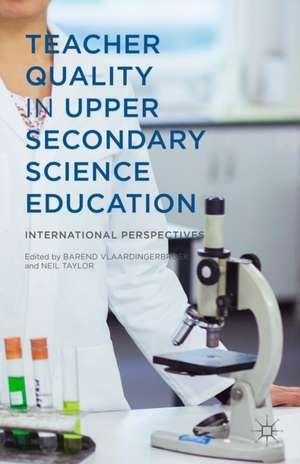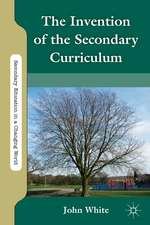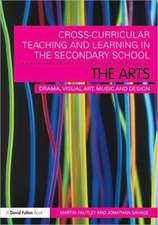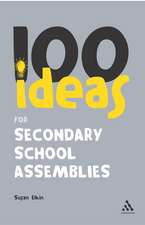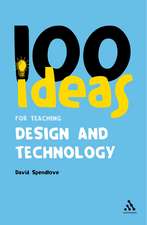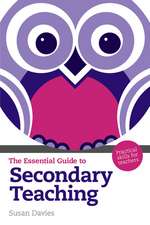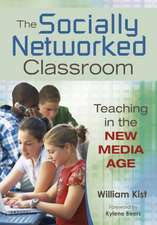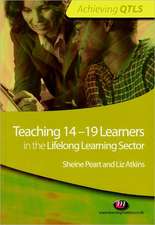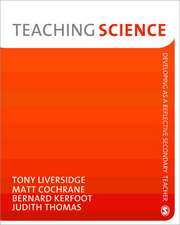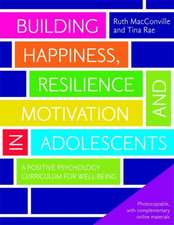Teacher Quality in Upper Secondary Science Education: International Perspectives
Editat de B. Vlaardingerbroek, N. Tayloren Limba Engleză Hardback – 7 mar 2016
Preț: 394.51 lei
Nou
Puncte Express: 592
Preț estimativ în valută:
75.49€ • 82.26$ • 63.61£
75.49€ • 82.26$ • 63.61£
Carte tipărită la comandă
Livrare economică 23 aprilie-07 mai
Preluare comenzi: 021 569.72.76
Specificații
ISBN-13: 9781137490889
ISBN-10: 1137490888
Pagini: 288
Ilustrații: IX, 286 p.
Dimensiuni: 140 x 216 x 18 mm
Greutate: 0.57 kg
Ediția:1st ed. 2016
Editura: Palgrave Macmillan US
Colecția Palgrave Macmillan
Locul publicării:New York, United States
ISBN-10: 1137490888
Pagini: 288
Ilustrații: IX, 286 p.
Dimensiuni: 140 x 216 x 18 mm
Greutate: 0.57 kg
Ediția:1st ed. 2016
Editura: Palgrave Macmillan US
Colecția Palgrave Macmillan
Locul publicării:New York, United States
Descriere
Upper secondary science is the bridge to science-related careers and thereby to human capital formation in science and technology. Quality rather than quantity is what counts at this level and teacher quality is a major determinant. This book looks at upper secondary science teacher quality in eighteen countries from affluent Organisation for Economic Co-operation and Development members to very poor countries. The yardsticks applied to teacher quality are academic and professional education and training, professional practice including the resource base, continuing professional development, and science teacher associations. All country case studies are written to facilitate internal cross-referencing, thereby accentuating the comparative nature of the volume. The book ends with an 'investment guide' that focuses on where and how money is best spent in relation to building up and maintaining a quality upper secondary science teaching force.
Cuprins
1. Introduction: Upper Secondary Science Teacher Quality—'Those Who Can'; Barend Vlaardingerbroek and Neil Taylor
2. Australia; Terry Lyons
3. Singapore; Lee Chin Chew and Kim Chwee Daniel Tan
4. Canada; Todd Milford and Christine Tippett
5. The Netherlands; Lesley de Putter-Smits and Jan van Driel
6. Japan; Toshihide Hirano
7. New Zealand; Peter Rawlins and Carrol Walkley
8. South Korea; Nam-Hwa Kang
9. Cluster Summary One
10. Oman; Abdullah Ambusaidi
11. Turkey; Muammer Çalik
12. Malaysia; Noraini Binti Idris
13. Nauru; Penelope Serow and Neil Taylor
14. Fiji; Salanieta Bakalevu, Mesake Dakuidreketi, and Temalesi Maiwaikatakata
15. Indonesia; Ari Widodo, Diana Rochintaniawati, and Riandi
16. Sri Lanka; Marie Perera
17. Cluster Summary Two
18. Yemen; Saouma BouJaoude and Khalid Khan
19. Bangladesh; Muhammad Salahuddin
20. Cambodia; Chan Oeurn Chey and Sitha Chhinh
21. Uganda; Charles Kivunja and John Sentongo
22. Cluster Summary Three
23. Banking on Quality Upper Secondary Science Teachers: An Investment Guide; Barend Vlaardingerbroek and Neil Taylor
2. Australia; Terry Lyons
3. Singapore; Lee Chin Chew and Kim Chwee Daniel Tan
4. Canada; Todd Milford and Christine Tippett
5. The Netherlands; Lesley de Putter-Smits and Jan van Driel
6. Japan; Toshihide Hirano
7. New Zealand; Peter Rawlins and Carrol Walkley
8. South Korea; Nam-Hwa Kang
9. Cluster Summary One
10. Oman; Abdullah Ambusaidi
11. Turkey; Muammer Çalik
12. Malaysia; Noraini Binti Idris
13. Nauru; Penelope Serow and Neil Taylor
14. Fiji; Salanieta Bakalevu, Mesake Dakuidreketi, and Temalesi Maiwaikatakata
15. Indonesia; Ari Widodo, Diana Rochintaniawati, and Riandi
16. Sri Lanka; Marie Perera
17. Cluster Summary Two
18. Yemen; Saouma BouJaoude and Khalid Khan
19. Bangladesh; Muhammad Salahuddin
20. Cambodia; Chan Oeurn Chey and Sitha Chhinh
21. Uganda; Charles Kivunja and John Sentongo
22. Cluster Summary Three
23. Banking on Quality Upper Secondary Science Teachers: An Investment Guide; Barend Vlaardingerbroek and Neil Taylor
Notă biografică
Barend Vlaardingerbroek is the Associate Professor at the American University of Beirut, Lebanon.
Neil Taylor is the Professor of Science and Technology Education at the University of New England, Australia.
Neil Taylor is the Professor of Science and Technology Education at the University of New England, Australia.
Textul de pe ultima copertă
Upper secondary science is the bridge to science-related careers and thereby to human capital formation in science and technology. Quality rather than quantity is what counts at this level and teacher quality is a major determinant. This book looks at upper secondary science teacher quality in eighteen countries from affluent Organisation for Economic Co-operation and Development members to very poor countries. The yardsticks applied to teacher quality are academic and professional education and training, professional practice including the resource base, continuing professional development, and science teacher associations. All country case studies are written to facilitate internal cross-referencing, thereby accentuating the comparative nature of the volume. The book ends with an 'investment guide' that focuses on where and how money is best spent in relation to building up and maintaining a quality upper secondary science teaching force.
